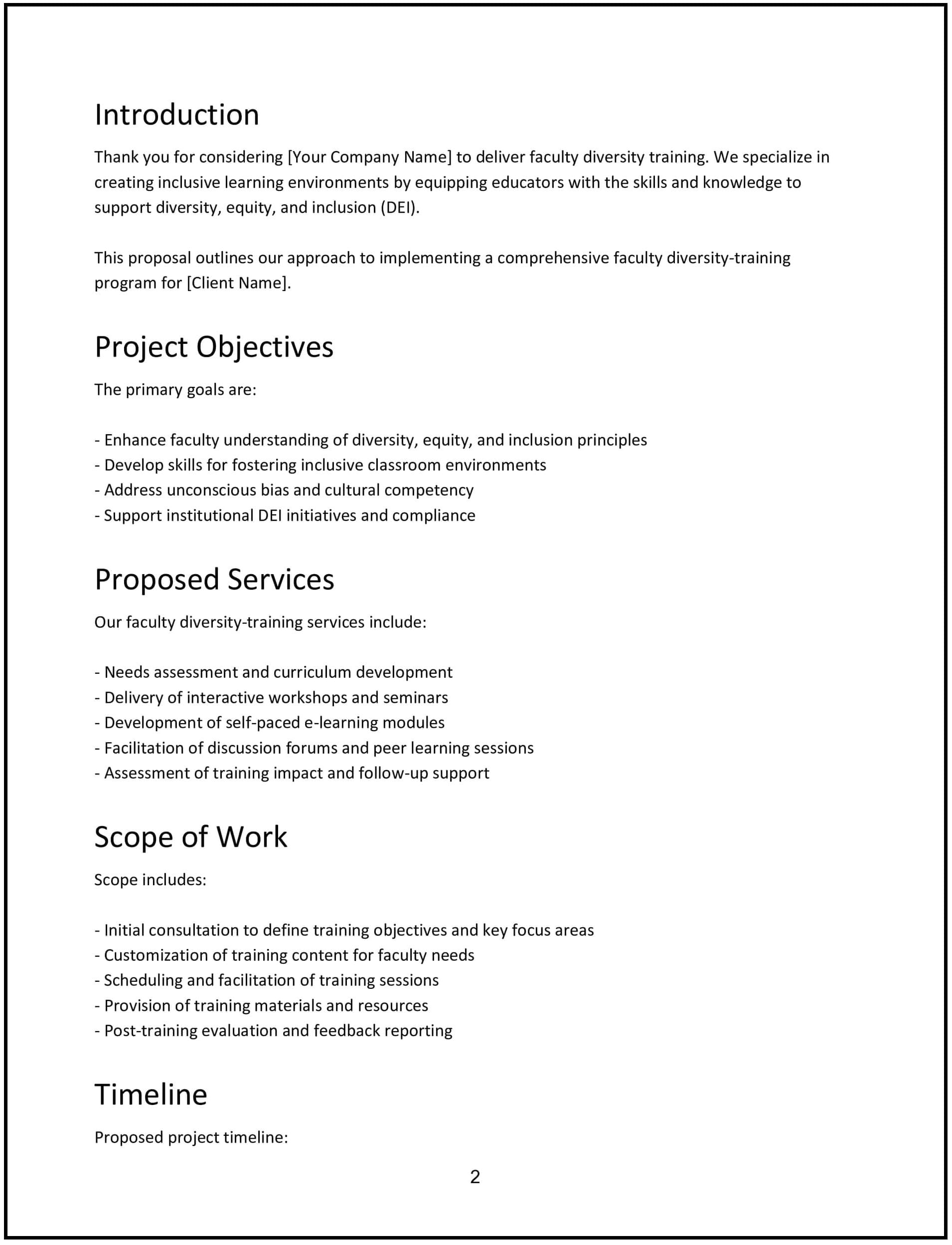Faculty diversity-training proposal: Free template
Got contracts to review? While you're here for proposals, let Cobrief make contract review effortless—start your free review now.

Customize this template for free
Customize this free faculty diversity-training proposal with Cobrief
Open this free faculty diversity-training proposal in Cobrief and start editing it instantly using AI. You can adjust the tone, structure, and content based on the institution type, faculty roles, and training format. You can also use AI to review your draft — spot gaps, tighten language, and improve clarity before sending.
Once you're done, send, download, or save the proposal in one click — no formatting or setup required.
This template is fully customizable and built for real-world use — ideal for pitching DEI-focused training to colleges, universities, professional schools, or academic departments. Whether you’re offering live sessions, online modules, or custom workshops, this version gives you a structured head start and removes the guesswork.
What is a faculty diversity-training proposal?
A faculty diversity-training proposal outlines your plan to deliver structured education on diversity, equity, and inclusion (DEI) principles to academic staff. It typically includes training goals, delivery methods, curriculum topics, audience scope, follow-up strategies, and pricing.
This type of proposal is commonly used:
- When institutions aim to strengthen inclusive teaching and reduce bias in academic settings
- To meet accreditation or grant-related DEI requirements
- As part of a broader campus climate or faculty development initiative
It helps institutions create more equitable learning environments while aligning with cultural, legal, and institutional goals.
A strong proposal helps you:
- Frame DEI training as action-oriented, research-informed, and directly applicable to teaching
- Clarify what content is covered, how it’s delivered, and how it’s measured
- Tailor your approach to the academic context and faculty concerns
- Position the program as part of long-term cultural improvement — not just compliance
Why use Cobrief to edit your proposal
Cobrief helps you build a more focused, effective proposal — with AI tools and live editing that save time and improve clarity.
- Edit the proposal directly in your browser: No need to reformat — just start typing and make changes instantly.
- Rewrite sections with AI: Tailor tone, restructure key points, or align language with academic audiences.
- Run a one-click AI review: Let AI flag unclear framing, vague takeaways, or missing outcomes.
- Apply AI suggestions instantly: Accept edits line by line or apply all updates across the proposal.
- Share or export instantly: Send your proposal through Cobrief or download a clean PDF or DOCX version to submit.
You’ll spend less time polishing and more time building institutional buy-in.
When to use this proposal
Use this faculty diversity-training proposal when:
- Proposing DEI training to universities, colleges, or academic departments
- Supporting faculty development initiatives focused on inclusive teaching or bias awareness
- Quoting live workshops, asynchronous e-learning, or blended formats
- Aligning with Title IX, accreditation, or institutional DEI plans
- Offering training tied to grant requirements or student climate feedback
It’s especially useful when institutions want meaningful cultural change, not just check-the-box training.
What to include in a faculty diversity-training proposal
Use this template to walk the client through the structure, content, and benefits of your training — clearly and credibly.
- Project overview: Summarize the institution’s DEI goals and how your training supports inclusive teaching, faculty engagement, and student outcomes.
- Learning objectives: Define what participants will gain — such as understanding systemic bias, recognizing classroom microaggressions, applying inclusive syllabus design, or managing difficult conversations.
- Curriculum content: Outline key modules or themes — such as intersectionality, implicit bias, cultural competency, inclusive pedagogy, and structural inequity.
- Training format: Specify the delivery model — in-person, virtual, asynchronous, or hybrid — and how long each session or module runs.
- Audience and customization: Identify the faculty groups targeted and whether content will be tailored to department needs, disciplines, or academic rank.
- Facilitation and credentials: Describe who will lead the training, including relevant experience in higher education, DEI, or facilitation.
- Engagement and follow-up: Note whether you’ll include assessments, feedback surveys, discussion groups, or office hours for ongoing support.
- Timeline: Provide a schedule for delivery, pre-session prep, and any optional follow-up or evaluation periods.
- Pricing: Present your fee structure — per session, per faculty cohort, or project-based. List optional add-ons like custom content, resource libraries, or leadership coaching.
- Next steps: End with a clear CTA — such as confirming scope, scheduling a discovery call, or approving session dates.
How to write an effective faculty diversity-training proposal
This proposal should feel respectful, grounded, and academically relevant — especially for institutions seeking substance over slogans.
- Focus on application, not just awareness: Show how DEI principles apply to teaching, mentorship, hiring, and curriculum design.
- Tailor content by context: Adjust tone and examples for community colleges, research universities, or professional schools.
- Avoid lecturing language: Frame training as participatory, nuanced, and respectful of faculty expertise.
- Highlight credentials and trust: Reinforce your experience with academic institutions and sensitive facilitation.
- Acknowledge resistance: Show how your sessions create space for reflection, learning, and faculty agency.
- Always close with one clear action: Help the institution move forward quickly and easily — don’t leave the process open-ended.